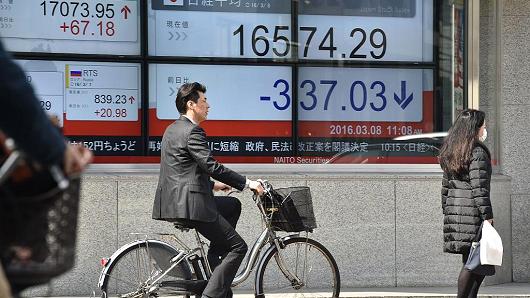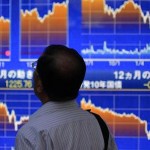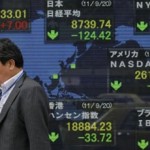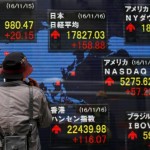Asian Equities, Yen Maintain Declines After BOJ: Markets Wrap

-
Region’s stocks halt five-day rally as China shares drop
-
Investors assess Trump’s U.S. tax plan; peso reverses losses
Asian stocks were mostly lower after a five-day rally as the Bank of Japan cut its inflation forecast while keeping stimulus unchanged, and investors assessed a plan to overhaul U.S. taxes.
Japanese stocks headed for their first decline in six days and the yen remained lower. Shanghai stocks resumed declines as regulatory concerns grew. The dollar dropped as the Mexican peso and Canadian dollar jumped, reversing earlier declines, after the White House dispelled speculation over the fate of Nafta. Market reaction in the U.S. to Donald Trump’s tax proposal suggested much of the benefits were already reflected in asset prices.
The BOJ kept its policy settings unchanged, while lowering its inflation forecast, underscoring that any exit from its unprecedented monetary easing remains far away. Governor Haruhiko Kuroda said last week that the accommodative policy and asset purchases will continue for some time because inflation is “quite sluggish.”
Global shares are trading at a record high on optimism for improving global economic growth. The much-anticipated plan for U.S. tax changes, including cuts that would benefit businesses, the middle class and certain high-earning individuals, left unanswered questions about whether it would be paid for, or how.
Investors are also turning to earnings for more clues on the global economy, with Thursday offering results from some of the biggest companies. The heavyweights include PetroChina Co. and Deutsche Bank AG, with Alphabet Inc. and Dow Chemical Co. on the menu for the U.S.
Concerns over China’s markets are resurfacing after a brief pause, as the government intensified its focus on tackling risks in the financial system. Stocks in China have lagged all but three national benchmarks in the world this month, struggling to keep up with increasing global risk appetite amid an accelerating campaign against leverage.
Here are some key upcoming events investors are watching:
- The European Central Bank is up next. ECB officials have indicated little chance of a policy change on Thursday. The focus will be on any signals from President Mario Draghi that the central bank is debating an exit from its extraordinary stimulus.
- U.S. GDP is due Friday. It’s projected to show the economy expanded at a 1 percent annualized rate in the first quarter, the weakest pace in a year.
Here are the main moves in markets:
Stocks
- The MSCI Asia Pacific Index slipped less than 0.1 percent from the highest level since June 2015 as of 12:52 p.m. in Tokyo.
- Japan’s Topix dropped 0.2 percent, after jumping 4.5 percent over the previous five days. The winning streak is the longest of this year.
- The Shanghai Composite index fell 0.4 percent and the Hang Seng Index was little changed.
- South Korea’s Kospi slipped 0.2 percent. The country’s economic growth accelerated in the first quarter as a recovery in exports supported investment. Samsung Electronics Co. jumped 1.5 percent as profit topped analysts’ expectations.
- Futures on the S&P 500 Index rose 0.1 percent. The underlying gauge fell 0.1 percent Wednesday. The Stoxx Europe 600 Index added 0.5 percent, for a sixth straight advance that’s taken it to the highest level since August 2015.
Currencies
- The yen slid 0.1 percent to 111.17 per dollar, bringing its weekly loss to 1.8 percent.
- The Bloomberg Dollar Spot Index dropped 0.2 percent after increasing 0.3 percent on Wednesday.
- The Mexican peso jumped 1.1 percent. The currency tumbled 1.7 percent to the lowest in a month on Wednesday on speculation the Trump administration was close to scrapping Nafta. The Canadian dollar rose 0.6 percent, after a four-day selloff.
- The South Korean won dropped 0.4 percent while the New Zealand dollar advanced 0.4 percent.
- The ruble climbed 0.4 percent. The currency slid 1.8 percent Wednesday after President Vladimir Putin said the government is looking for “market-based measures” to stabilize the currency.
Bonds
- The yield on 10-year Treasuries rose one basis point to 2.32 percent. The rate fell three basis points to 2.30 percent on Wednesday, after climbing for five straight sessions.
- Japan 10-year yields rose less than one basis point, and Australian benchmark yields lost two basis points to 2.61 percent.
Commodities
- Gold resumed losses, with the spot price dropping 0.2 percent to $1,266.95 an ounce. The metal climbed 0.4 percent Wednesday after a two-day decline.
- Oil fell 0.5 percent to $49.37 a barrel. trading near the lowest level in a month.
Source: Bloomberg




























